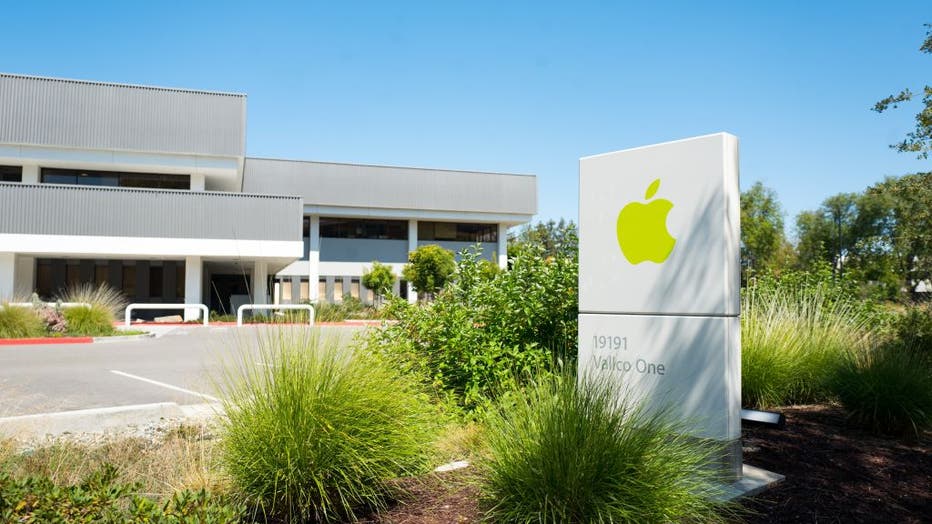'Not enough representation’: Silicon Valley Latinas struggle to enter tech industry
Google headquarters is seen in Mountain View, California. (Photo by Tayfun Coskun/Anadolu Agency via Getty Images)
SAN JOSE, Calif. - Despite being raised in the shadow of tech giants like Apple and Google, Stephanie Valenzuela struggled to see how she fit into the industry. As a Latina, Valenzuela said she rarely saw herself represented.
Valenzuela has worked as a tech recruiter as part of a small cohort of Latinas in the sector. She wants to continue helping other Latinas develop the confidence and experience needed to become part of this lucrative industry.
"I don't know if they know that we exist," Valenzuela told San Jose Spotlight, referring to tech employers. "I don't know if they know that we come with a certain skill set... I grew up in a certain part of Eastside San Jose, and I had certain experiences that maybe (others) didn't have."
According to the 2023 Silicon Valley Pain Index, an annual report by researchers at San Jose State University showing structural inequalities in the area, just 2% of Latinas are in the tech sector despite making up nearly 13% of Santa Clara County's population. In the last few years, nonprofit organizations and school programs have worked to get more Latinas into the hiring pipeline in Silicon Valley. Yet biases and roadblocks persist.
Valenzuela, 33, who is a former board member of the Latina Coalition of Silicon Valley, said one large factor barring Latina women from the tech industry is unconscious bias, with recruiters hiring people from the same backgrounds.
Mirella Maldonado, College Success and STEM Programs Manager for the Hispanic Foundation of Silicon Valley, works with her organization to empower the local Latino community through philanthropy, education and leadership development. She said there are multiple factors stopping Latinas from being able to find access points into the tech sector. Women don't feel they belong in male-dominated workspaces. There is a lack of educational opportunities for Latinas to learn about science, technology, engineering and mathematics, and a lack of mentorship by Latinas with similar lived experiences.
"One of the biggest reasons why there isn't (enough) Latinos yet is because we don't have a good support system to support them climbing that ladder," Maldonado told San Jose Spotlight. "It all stems back to: there's still not enough representation or mentorship."

Sign with green colored logo amid landscaping, with facades of buildings in background, near the headquarters of Apple Computers in the Silicon Valley, Cupertino, California, August 26, 2018. (Photo by Smith Collection/Gado/Getty Images)
Bridging the gap
The Hispanic Foundation of Silicon Valley has worked to bridge this gap by focusing on education. The Latino in Technology Scholarship was created to help young Latinas from Santa Clara County or who attend a university in the area enter the tech industry. They implemented a program, "Girls Who Code," for fifth through eighth graders who are taught by industry professionals.
Isaura Gaeta has been in the tech sector for more than 40 years and is also a board member of the Hispanic Foundation of Silicon Valley. She said part of the work being done by the foundation is to provide students with role models and to also engage parents.
"The foundation is creating programs that help students be more successful, that build that sense of community with each other, so that together as a cohort, they can persevere," Gaeta told San Jose Spotlight.
Despite the hurdles for young Latinas, there are advocates working to connect these women to future employers. Gabriela Chavez-Lopez, executive director of the Latina Coalition of Silicon Valley, said her organization is hosting the Futura Fest later this month -- aimed at helping Latinas navigate entering different industries, including the tech sector. The organization also offers various programs that help Latinas build a support network.
Chavez-Lopez said it is important for the industry to recruit from the local community, as it provides high wages that are critical to living in Silicon Valley, which has a cost of living that drives young talent out of the city.
"There's just a lot of chips stacked against us when it comes to access to a lot of these kind[s] of specialized fields," Chavez-Lopez told San Jose Spotlight. "The sky's the limit when it comes to tech... and potential is huge for our area (because) it is a dominant industry."
As for Valenzuela, who is in-between positions in the tech industry, she said these initiatives by organizations and the need for representation by Latinas in the tech sector are what propel her to stay in the industry.
"If I don't stay in tech, I can't be that person, that someone else who's maybe younger than me, who's a Latina, who's searching to be in tech (can look up to)," Valenzuela said. "I can be that face and (person) that gives that helping hand."

